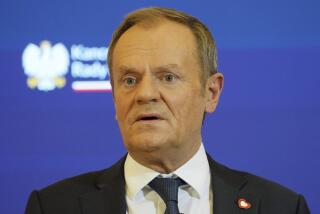Jaruzelski Gets Briton’s Advice at State Banquet : Freedom Works, Thatcher Tells Poles
- Share via
WARSAW — British Prime Minister Margaret Thatcher called on Poland’s Communist leadership of Gen. Wojciech Jaruzelski on Thursday to accept free trade unions and greater personal freedoms, calling them indispensable to the economic transformation the nation is attempting.
Turning to Jaruzelski at a state banquet here Thursday night, Thatcher acknowledged his plans for reforming Poland’s economy, then bluntly advised him: “You will only achieve higher growth, only release enterprise, only spur people to greater effort, only obtain their full-hearted commitment to reform, when people have the dignity and enjoyment of personal and political liberty, when they have the freedom of expression, freedom of association and the right to form free and independent trade unions.”
The statement, on the second day of Thatcher’s ground-breaking visit here, appeared to give a boost to the banned Solidarity labor movement at a time when a nascent dialogue between the union and government on its reinstatement has broken down. Thatcher said it is vital for the party leadership to have “a real dialogue with representatives of all sections of society, including Solidarity.”
In an apparent effort to appear open to continued negotiations with Solidarity during Thatcher’s stay, Interior Minister Czeslaw Kiszczak on Thursday reiterated a proposal to hold another meeting with Solidarity leader Lech Walesa in order to eliminate obstacles to proposed “round-table” talks involving the government and opposition. But Walesa, who has already rejected the idea several times over the last 10 days, said only that he would delay his answer “out of respect for Prime Minister Thatcher.”
Both Solidarity and the government are seeking to use the high-profile visit, the first by a British prime minister to Poland, to justify their political stands both in and outside Poland as it heads toward a new round of conflict. British officials had said that Thatcher would avoid taking sides in the struggle or its current focal point: the announcement Monday of plans to close the Lenin Shipyard in Gdansk, Solidarity’s birthplace.
However, Thatcher is due to have lunch with Walesa in Gdansk today. She will also lay flowers with him at a Solidarity-sponsored monument outside the shipyard gate.
In Warsaw on Thursday, Thatcher responded coolly to the government’s pleas for economic assistance and was cheered by thousands of onlookers as she toured a shopping market and visited the grave of a martyred pro-Solidarity priest.
Thatcher appeared to resist aggressive efforts by the Communist leadership to win her endorsement of its political and economic policies. Instead, in a meeting with Premier Mieczyslaw Rakowski, she criticized the lack of free-market prices or other economic incentives and ignored a plea for help on Poland’s $39-billion foreign debt, British officials said.
The prime minister was cheered by several thousand waiting Poles when she arrived at St. Stanislaw Kostka Church to lay flowers at the grave of Father Jerzy Popieluszko, a priest murdered by security forces in 1984.
Thatcher also received a warm reception in a wreath-laying ceremony at the Tomb of the Unknown Soldier and in a visit to a large state shopping market. Thousands of people crowded into the Hala Mirowska market to catch a glimpse of the prime minister as she made her way down a main corridor, stopping to buy jars of preserves, honey and pickled mushrooms.
The crowd applauded in response to Thatcher’s waves and dozens grasped her hands in spontaneous enthusiasm; one young woman darted into her path to plant a kiss on her cheek.
The atmosphere at these public appearances offered a glaring contrast with the visit here in June of Soviet President Mikhail S. Gorbachev, who was carefully shepherded by his hosts from one pre-selected crowd to the next in sites sealed off by security forces. In the few instances where average Poles had a chance to see Gorbachev, only a handful made the effort.
More to Read
Sign up for Essential California
The most important California stories and recommendations in your inbox every morning.
You may occasionally receive promotional content from the Los Angeles Times.













